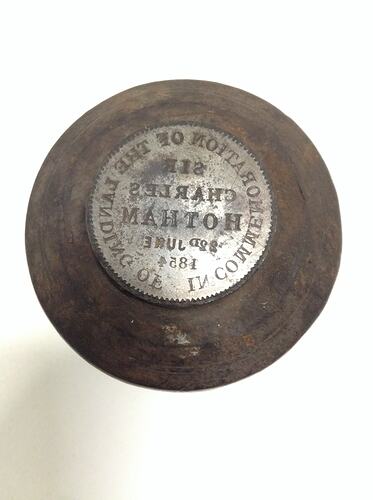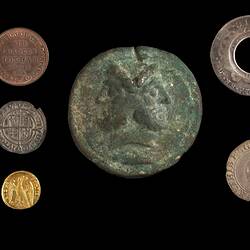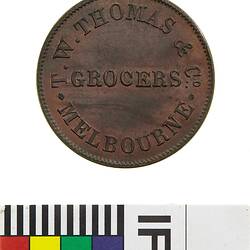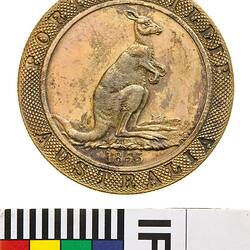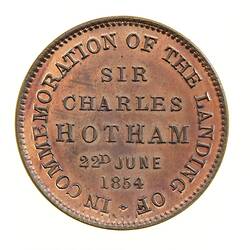Summary
Steel Halfpenny die, manufactured by the Kangaroo Office of Melbourne, in 1854. The die features a commemoration of the arrival of Sir Charles Hotham in Victoria on 22 June 1854. It was used as the reverse for several issues of tokens minted by the Kangaroo Office, including James Nokes and T.W. Thomas.
W. J. Taylor and his business partners established the Kangaroo Office to take advantage of the explosive economic growth in Australia following the discovery of gold in 1851. They hoped to buy gold at greatly reduced prices from the gold fields and then release it at full value in the form of quarter-ounce, half-ounce, one ounce and two ounce gold coins. However due to the time required to travel between London and Melbourne, once the Kangaroo Office was ready for business in 1854, an increase in the number of British sovereigns, had seen the price of gold rise, and the potential profits for the Kangaroo Office sharply decline. Not deterred, in late 1954 Taylor prepare dies for a series of pattern copper tokens that it was hoped could be produced in Melbourne by the Kangaroo Office for circulation within Australia. It appears that this did not succeed, and in 1855 Taylor began to create shilling and sixpence patterns in silver. However the Kangaroo Office again failed to obtain authority to strike and circulate these silver tokens and in 1857 the Kangaroo Office closed.
Physical Description
A steel die 51 mm high with a base diameter of 53 mm and a working surface diameter of 34 mm. The die features a commemoration of the arrival of Sir Charles Hotham in Victoria on 22 June 1854
Obverse Description
IN COMMEMORATION OF THE LANDING OF SIR CHARLES HOTHAM 22D 1854 (all incuse mirror)
More Information
-
Collecting Areas
-
Acquisition Information
Transfer from National Gallery of Victoria (NGV), 15 Mar 1976
-
Date Issued
1854 AD
-
Issued By
-
Mint
Kangaroo Office (Mint), Melbourne, Greater Melbourne, Victoria, Australia
-
Commissioned By
James Nokes - James Nokes, Wholesale and Retail Grocer, Melbourne, Greater Melbourne, Victoria, Australia, 1854
-
Inscriptions
IN COMMEMORATION OF THE LANDING OF SIR CHARLES HOTHAM 22D 1854 (all incuse mirror)
-
Denomination
-
Series
-
Material
Steel
-
Classification
-
Category
-
Discipline
-
Type of item
-
Dimensions
51 mm (Height), 53 mm (Outside Diameter)
-
Shape
Cylinder
-
Keywords
Gold, Grocers, Numismatic Dies, Numismatic Technology, Retail Trade, Retailing
